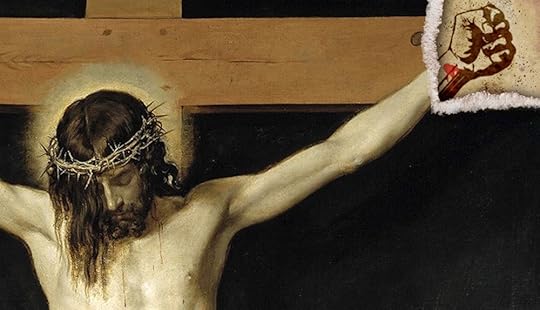Christian Nihilism: Good Friday and the Primordial Chaos

In ikon we liked to play with different subtitles for the event. One of my favorites was “Ikon: Where everyday is Good Friday.”
While this was mainly a playful title reflecting the reputation ikon had for rather dark and disturbing themes, it also captured a deeper truth about what we had created.
The theological theory and technology that we were forging took seriously the idea that Easter symbolized the difficult move into a radically different type of existence. A move that brought us into a place that could be called, following, Dietrich Bonhoeffer, “Religionless Christianity.”
From the perspective of Pyrotheology, Good Friday symbolizes a type of subtraction from the world of meaning. It exposes the contingent reality of all our religious and political regimes – even the universe itself – and plunges us into a type of deep nihilism.
Crucifixion originally represented the individual’s subtraction from the religious system because a crucified person was considered cursed of God. It also represented the individual’s subtraction from the political system because the crucified person was no longer considered a subject. To be crucified was to be stripped naked, both literally and figuratively, and left to rot outside the walls of the city. It meant that one was ripped away from the world of meaning and plunged into a dark oceanic horror of dizzying primordial chaos.
I’ll post something about Resurrection on Sunday, but let us not think that Sunday is a Monopoly card that gets us out of some cell. If anything, Good Friday is the “Get out of Jail free” card. It is that which helps us escape the prison-house of meaning. The Resurrection, from a pyrotheological perspective, is not some religious return of meaning (grounding us in a universal peace), but rather a religionless courage that equips us to bear the weight of the Cross. Finding meaning without the support of ultimate meaning. In other words, Resurrection does not point to the abolishing of Nihilism, but rather of a life that robs it of its sting.
In theological terms, Easter exposes how the Absolute is not the guarantee of meaning, but rather that which binds the body of activists together in works of love without guarantee.
One of the few explicitly theological texts I’ve come across that explores this disturbing idea is Christ and the End of Meaning by Paul Hessert. In my four-week online exploration of Religionless Christianity in June – The Omega Course – I’ll be delving into the searing insights of this work (among others).
Or, if you want to go as deep as you can into Religionless Christianity, you can always pick up one of the last two tickets for my Wake Festival in N. Ireland this April.
Peter Rollins's Blog
- Peter Rollins's profile
- 314 followers



